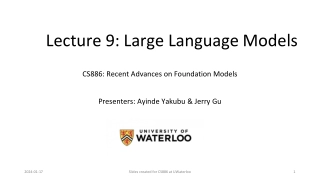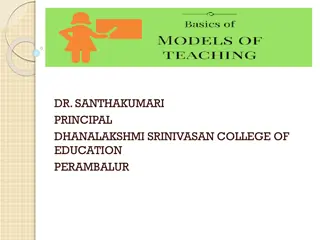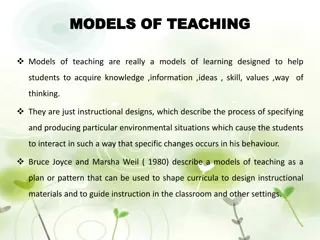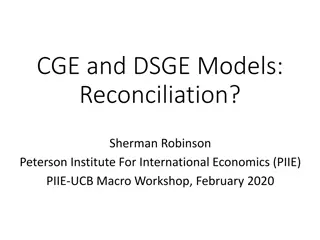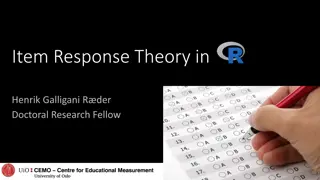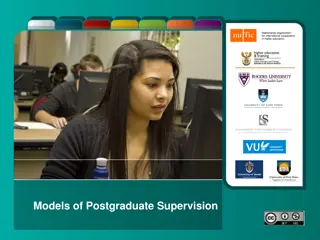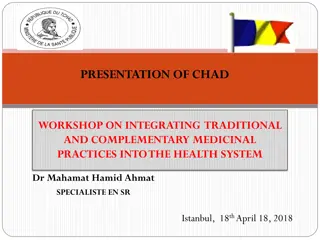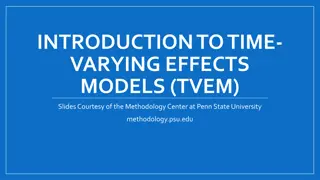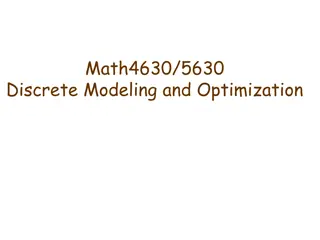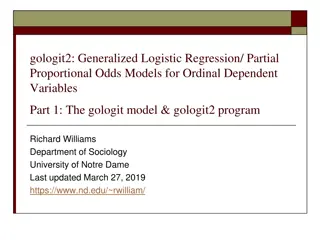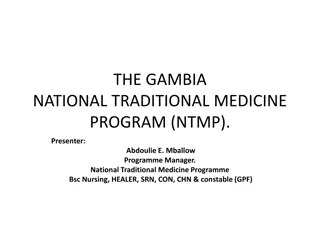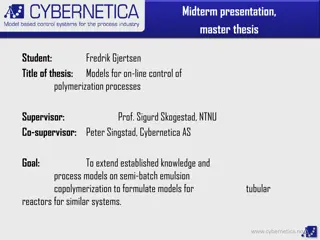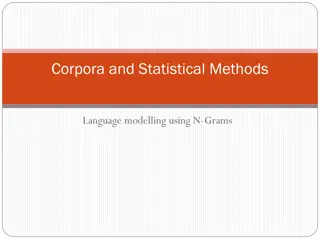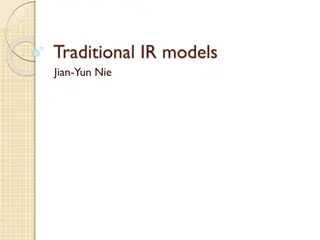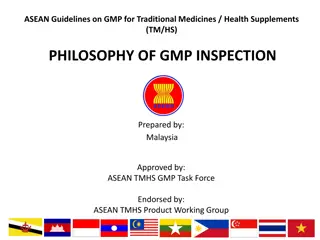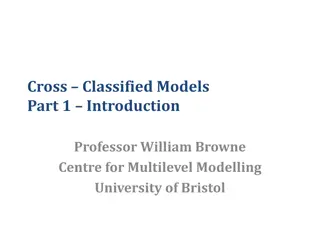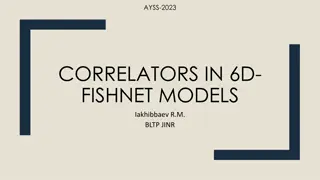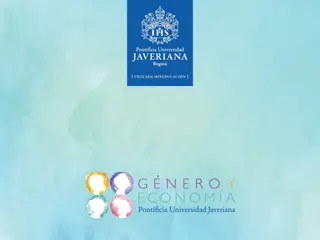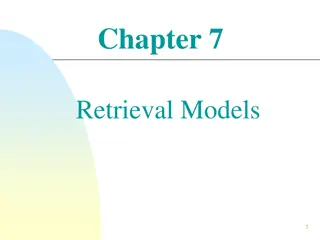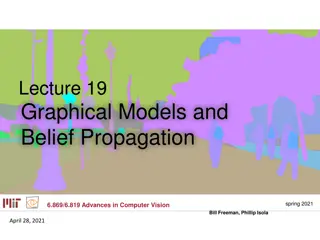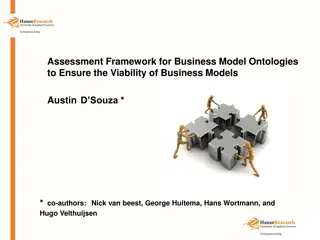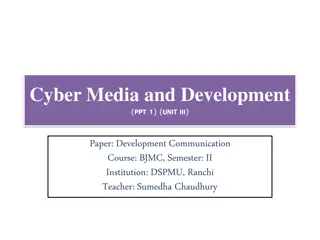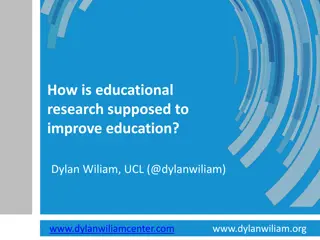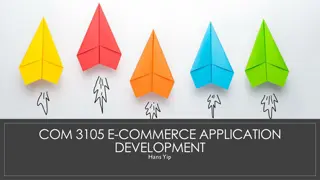The Evolution of Mobile Gaming: From Pay-to-Play to Free-to-Play
The mobile gaming industry has witnessed significant changes in pricing models over the years. With an enormous global audience, mobile games now dominate the gaming market with a shift towards free-to-play models. This evolution has led to innovative monetization strategies such as in-game purchase
1 views • 45 slides
Recent Advances in Large Language Models: A Comprehensive Overview
Large Language Models (LLMs) are sophisticated deep learning algorithms capable of understanding and generating human language. These models, trained on massive datasets, excel at various natural language processing tasks such as sentiment analysis, text classification, natural language inference, s
2 views • 83 slides
Global Climate Models
Scientists simulate the climate system and project future scenarios by observing, measuring, and applying knowledge to computer models. These models represent Earth's surface and atmosphere using mathematical equations, which are converted to computer code. Supercomputers solve these equations to pr
3 views • 15 slides
System Models in Software Engineering: A Comprehensive Overview
System models play a crucial role in software engineering, aiding in understanding system functionality and communicating with customers. They include context models, behavioural models, data models, object models, and more, each offering unique perspectives on the system. Different types of system
4 views • 33 slides
Understanding Input-Output Models in Economics
Input-Output models, pioneered by Wassily Leontief, depict inter-industry relationships within an economy. These models analyze the dependencies between different sectors and have been utilized for studying agricultural production distribution, economic development planning, and impact analysis of i
8 views • 7 slides
Generalized Additive Models
Generalized Additive Models (GAMs) provide a flexible and automatic statistical method for identifying and characterizing nonlinear regression effects. Unlike traditional linear models, GAMs can capture non-linear relationships between predictors and outcomes using unspecified smooth functions. By f
0 views • 52 slides
Understanding Models of Teaching in Education
Exploring different models of teaching, such as Carroll's model, Proctor's model, and others, that guide educational activities and environments. These models specify learning outcomes, environmental conditions, performance criteria, and more to shape effective teaching practices. Functions of teach
2 views • 20 slides
Understanding Models of Teaching for Effective Learning
Models of teaching serve as instructional designs to facilitate students in acquiring knowledge, skills, and values by creating specific learning environments. Bruce Joyce and Marsha Weil classified teaching models into four families: Information Processing Models, Personal Models, Social Interactio
1 views • 28 slides
Advancements in Air Pollution Prediction Models for Urban Centers
Efficient air pollution monitoring and prediction models are essential due to the increasing urbanization trend. This research aims to develop novel attention-based long-short term memory models for accurate air pollution prediction. By leveraging machine learning and deep learning approaches, the s
0 views • 17 slides
Significance of Models in Agricultural Geography
Models play a crucial role in various disciplines, including agricultural geography, by offering a simplified and hypothetical representation of complex phenomena. When used correctly, models help in understanding reality and empirical investigations, but misuse can lead to dangerous outcomes. Longm
0 views • 8 slides
Understanding CGE and DSGE Models: A Comparative Analysis
Explore the similarities between Computable General Equilibrium (CGE) models and Dynamic Stochastic General Equilibrium (DSGE) models, their equilibrium concepts, and the use of descriptive equilibria in empirical modeling. Learn how CGE and DSGE models simulate the operation of commodity and factor
4 views • 15 slides
Enhancing Information Retrieval with Augmented Generation Models
Augmented generation models, such as REALM and RAG, integrate retrieval and generation tasks to improve information retrieval processes. These models leverage background knowledge and language models to enhance recall and candidate generation. REALM focuses on concatenation and retrieval operations,
1 views • 9 slides
Understanding Item Response Theory in Measurement Models
Item Response Theory (IRT) is a statistical measurement model used to describe the relationship between responses on a given item and the underlying trait being measured. It allows for indirectly measuring unobservable variables using indicators and provides advantages such as independent ability es
2 views • 32 slides
Understanding Models of Postgraduate Supervision and Different Supervisory Approaches
Explore the various roles, styles, and models of postgraduate supervision, delving into the distinctions between supervisor tasks, interaction approaches, and supervision structures. Learn how different supervision models like one-on-one, panel, project, and doctoral programme supervision impact res
1 views • 13 slides
Chad Workshop on Integrating Traditional and Complementary Medicinal Practices
Chad held a workshop on integrating traditional and complementary medicinal practices into the health system, emphasizing the importance of traditional medicine alongside modern medical care. The presentation highlighted the country's population, reliance on traditional medicine, legal frameworks, a
0 views • 12 slides
Understanding Time-Varying Effects Models (TVEM) in Research
Explore the concept of Time-Varying Effects Models (TVEM) and why they are essential in analyzing interventions over time. Learn how TVEM differs from traditional regression models by incorporating time to evaluate changes in effects dynamically.
1 views • 35 slides
Approaches to Study Comparative Politics: Traditional vs. Modern Perspectives
This chapter discusses the importance of approaches in the study of comparative politics, categorizing them into traditional and modern perspectives. Traditional approaches include philosophical, historical, and traditional institutional approaches, highlighting their strengths and limitations. Mode
0 views • 7 slides
Understanding Discrete Optimization in Mathematical Modeling
Discrete Optimization is a field of applied mathematics that uses techniques from combinatorics, graph theory, linear programming, and algorithms to solve optimization problems over discrete structures. This involves creating mathematical models, defining objective functions, decision variables, and
0 views • 12 slides
Overview of gologit2: Generalized Logistic Regression Models for Ordinal Dependent Variables
gologit2 is an advanced program for estimating generalized logistic regression models, including proportional odds, generalized ordered logit, and partial proportional odds models. It offers features beyond traditional ologit, allowing for less restrictive and more parsimonious modeling of ordinal d
0 views • 27 slides
Traditional Medicine Integration into Gambian Health System
The Gambia's National Traditional Medicine Program aims to integrate traditional and complementary medicine practices into the health system. Established in 2001, the program faces challenges in regulating practitioners and ensuring the safety of herbal products. Despite these hurdles, it strives to
0 views • 21 slides
Observational Constraints on Viable f(R) Gravity Models Analysis
Investigating f(R) gravity models by extending the Einstein-Hilbert action with an arbitrary function f(R). Conditions for viable models include positive gravitational constants, stable cosmological perturbations, asymptotic behavior towards the ΛCDM model, stability of late-time de Sitter point, a
1 views • 12 slides
Understanding Wireless Propagation Models: Challenges and Applications
Wireless propagation models play a crucial role in characterizing the wireless channel and understanding how signals are affected by environmental conditions. This article explores the different propagation mechanisms like reflection, diffraction, and scattering, along with the challenges and applic
1 views • 14 slides
Models for On-line Control of Polymerization Processes: A Thesis Presentation
This presentation delves into developing models for on-line control of polymerization processes, focusing on reactors for similar systems. The work aims to extend existing knowledge on semi-batch emulsion copolymerization models, with a goal of formulating models for tubular reactors. Strategies, ba
0 views • 16 slides
Understanding N-Gram Models in Language Modelling
N-gram models play a crucial role in language modelling by predicting the next word in a sequence based on the probability of previous words. This technology is used in various applications such as word prediction, speech recognition, and spelling correction. By analyzing history and probabilities,
0 views • 101 slides
Understanding Information Retrieval Models and Processes
Delve into the world of information retrieval models with a focus on traditional approaches, main processes like indexing and retrieval, cases of one-term and multi-term queries, and the evolution of IR models from boolean to probabilistic and vector space models. Explore the concept of IR models, r
0 views • 65 slides
ASEAN Guidelines on GMP for Traditional Medicines - Philosophy of Inspection
The ASEAN Guidelines on GMP for Traditional Medicines highlight the Philosophy of Inspection for ensuring quality and safety in traditional medicines and health supplements. The document covers legal terms, audit trail requirements, electronic signature control, and familiar auditor requirements. It
0 views • 88 slides
Understanding Cross-Classified Models in Multilevel Modelling
Cross-classified models in multilevel modelling involve non-hierarchical data structures where entities are classified within multiple categories. These models extend traditional nested multilevel models by accounting for complex relationships among data levels. Professor William Browne from the Uni
0 views • 13 slides
Exact Correlation Models in Biscalar Fishnet Theory
In the study of biscalar fishnet models, various operators and spectra were explored, leading to findings on exact correlation functions, strong coupling regimes, Regge limits, and more in arbitrary dimensions. The investigation delves into Lagrangian formulations, graph-building operators, conforma
0 views • 15 slides
Understanding General Equilibrium Models and Social Accounting Matrices
General Equilibrium Models (CGE) and Social Accounting Matrices (SAM) provide a comprehensive framework for analyzing economies and policies. This analysis delves into how CGE models help simulate various economic scenarios and their link to SAM, which serves as a key data input for the models. The
0 views • 50 slides
Evolution of the Australian NewLaw Landscape: Trends and Perspectives
The Australian NewLaw landscape is witnessing significant changes with the emergence of new firms, innovative structures, pricing models, and career paths. Peter Moran, a legal professional with diverse experience, shares insights from his journey in establishing Peer Legal—a NewLaw firm focused o
0 views • 18 slides
Understanding Retrieval Models in Information Retrieval
Retrieval models play a crucial role in defining the search process, with various assumptions and ranking algorithms. Relevance, a complex concept, is central to these models, though subject to disagreement. An overview of different retrieval models like Boolean, Vector Space, and Probabilistic Mode
0 views • 56 slides
Graphical Models and Belief Propagation in Computer Vision
Identical local evidence can lead to different interpretations in computer vision, highlighting the importance of propagating information effectively. Probabilistic graphical models serve as a powerful tool for this purpose, enabling the propagation of local information within an image. This lecture
0 views • 50 slides
Assessing Business Model Ontologies for Sustainable Business Viability
This research delves into the assessment framework for business model ontologies to ensure the sustainability and viability of business models. It focuses on embedding decentralized energy supply within a combined energy infrastructure to create new business models. The study aims to identify the mo
0 views • 21 slides
Understanding Scientific Models and Their Applications
Explore the world of scientific models through this informative content covering physical, mathematical, and conceptual models. Discover why models are used in science, their types, and potential limitations. Delve into the importance of utilizing models to comprehend complex concepts effectively.
0 views • 21 slides
Understanding Statistical Models in Neuroscience Research
Dive into the world of statistical models in neuroscience research with a focus on model introduction, fitting, and comparison. Explore the significance of these models in describing and explaining complex phenomena using examples and common models prevalent in the field.
0 views • 32 slides
The Impact of Cyber Media on Traditional Journalism
Cyber media, a merging of cybernetics and media theories, poses challenges to traditional journalism as it transitions to the online realm. With the rise of new media platforms, traditional journalists face uncertainty in adapting to the changing landscape dominated by citizen reporting and social m
0 views • 6 slides
Understanding Composite Models in Building Complex Systems
Composite models are essential in representing complex entities by combining different types of models, such as resource allocation, transport, and assembly models. Gluing these models together allows for a comprehensive representation of systems like the milk industry, where raw materials are trans
0 views • 27 slides
Understanding the Role of Educational Research in Improving Education
Educational research plays a crucial role in enhancing educational practices and outcomes. Dylan Wiliam presents two contrasting views on the role of research in education, highlighting the need for a balance between empirical findings and teacher-led action research to drive effective practices. Th
0 views • 26 slides
Revenue Models for Online Business: Exploring Different Strategies
Learn about revenue models in e-commerce, including web catalogs, digital content, advertising-supported, fee-based, and fee-for-service models. Discover how companies leverage these models for both B2C and B2B online sales, examining the evolution from traditional mail-order catalogs to modern web-
0 views • 41 slides
Exploring Research Design and Funding Priorities in Northern Ireland
Dive into the world of research at the upcoming Application and Research Design Workshop scheduled for Friday, 28th May 2021. Discover the strategic priorities driving impactful research initiatives, learn about current research projects, funding processes, and collaborations. Explore the rich histo
0 views • 37 slides

